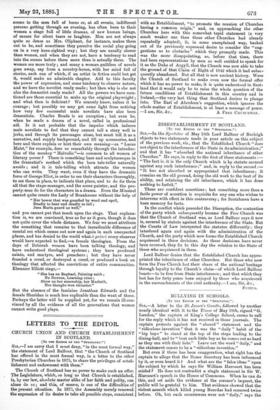DISESTABLISHMENT IN SCOTLAND.
(To THE EDITOR OF THE " SPECTATOR:1 Sts,—In the Spectator of May 16th Lord Balfour of Burleigh objects to two statements made in your article on this subject of the previous week, viz., that the Established Church "does not object to the interference of the State in its administration;" and that it has " absorbed the national inheritance of other Churches." He says, in reply to the first of these statements :— " The fact is, it is the only Church which is by statute secured against any such interference ;" and, in reply to the second :"It has not absorbed or appropriated that inheritance ; it remains on the old ground, doing the old work to the best of its ability, and retaining the old inheritance, which it has done nothing to forfeit."
These are confident assertions ; but something more than a facile power of assertion is requisite for any one who wishes to intervene with effect in this controversy ; for Scotchmen have a keen memory for facts.
In the conflict which preceded the Disruption, the contention of the party which subsequently became the Free Church was that the Church of Scotland was, as Lord Balfour says it now is, secured by statute against the interference of the State. But the Courts of Law interpreted the statutes differently ; they interfered again and again with the administration of the Church, and the party which now forms the Established Church acquiesced in these decisions. As these decisions have never been reversed, they fix to this day the relation to the State of those who acquiesced in them.
Lord Balfour denies that the Established Church has appropriated the inheritance of other Churches. But those who now form the Free Church lost their share of the national heritage through loyalty to the Church's claim—of which Lord Balfour boasts—to be free from State interference ; and that which they lost has for forty years been enjoyed by those who acquiesced in the encroachments of the civil authority.—I am, Sir, &c.,
SCOTUS.


































 Previous page
Previous page